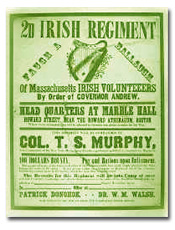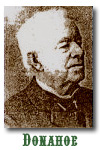1862
| 1863 | 1864 |
1865
"I
have not a word, other than that of unqualified commendation, to bestow
upon this well-regulated and admirably disciplined regiment."
-Brig.
Gen. Thomas F. Meagher
Regimental
History: 1861
 hen
Massachusetts Gov. John A. Andrew first
issued a call for volunteers
in May 1861, the state quickly raised a number of
regiments, including one composed
almost entirely of men who were Irish by birth or
heritage: the 9th Massachusetts Volunteer Infantry.
hen
Massachusetts Gov. John A. Andrew first
issued a call for volunteers
in May 1861, the state quickly raised a number of
regiments, including one composed
almost entirely of men who were Irish by birth or
heritage: the 9th Massachusetts Volunteer Infantry.
 As additional calls were
made for more
troops after the Union defeat at Bull Run in July, Gov. Andrew hoped to
raise two more all-Irish regiments from the large ethnic population of
the state.
As additional calls were
made for more
troops after the Union defeat at Bull Run in July, Gov. Andrew hoped to
raise two more all-Irish regiments from the large ethnic population of
the state.
Officially authorized by the governor on
September 24, the 28th and 29th Massachusetts Volunteer Infantry
Regiments began recruiting in Boston and Framingham, respectively, on
October 8.
Irish-American leaders – including
Patrick Donahoe, publisher of The Pilot, one of the most influential
Irish Catholic newspapers in the country at the time –
offered encouragement and assistance. New recruits were promised pay
and rations upon enlistment, state subsidies for their families,
Catholic chaplains to accompany their regiments in the field, and
bounties of $100 when the campaign was over.
 These efforts were undoubtedly bolstered
by the well-timed Boston appearance of Thomas Francis Meagher on
September 23. One of the best-known immigrant Irish nationalists in
America, Meagher attracted a capacity crowd to the Boston Music Hall,
with a large overflow of people milling about in the street. He made
good use of his well-known oratorical skills, conjuring Irish and
American symbolism to whip those gathered into a patriotic frenzy.
These efforts were undoubtedly bolstered
by the well-timed Boston appearance of Thomas Francis Meagher on
September 23. One of the best-known immigrant Irish nationalists in
America, Meagher attracted a capacity crowd to the Boston Music Hall,
with a large overflow of people milling about in the street. He made
good use of his well-known oratorical skills, conjuring Irish and
American symbolism to whip those gathered into a patriotic frenzy.
While his dedication to the cause was
genuine, the ambitious Meagher was also, in a sense, hedging his bets.
His primary aim was to raise an entire brigade of ethnic Irish
regiments which he ultimately hoped to command in the field. But he
apparently secured a promise from Gov. Andrew of a commission in one of
the Massachusetts Irish regiments if his efforts to build an ethnic
brigade fell short.
 In spite of these efforts, recruiting of
additional Irish-Americans during fall 1861 failed to meet the
anticipated numbers, at least in part because many Irishmen had already
joined other regiments, such as the 15th and 19th Massachusetts. Both
units were recruited over the previous summer and contained large
numbers of Irish, although they were never designated specifically as
Irish regiments.
In spite of these efforts, recruiting of
additional Irish-Americans during fall 1861 failed to meet the
anticipated numbers, at least in part because many Irishmen had already
joined other regiments, such as the 15th and 19th Massachusetts. Both
units were recruited over the previous summer and contained large
numbers of Irish, although they were never designated specifically as
Irish regiments.
Faced with two half-strength ethnic units,
state officials moved the Irish recruits who enlisted in Framingham to
Cambridge and assigned them to the 28th, and filled up the ranks of the
29th with mostly Yankee volunteers from around the state. The 28th was
recruited up to strength by late fall and officially mustered into
federal service on December 13, 1861.
Although a small number of the new soldiers
were skilled artisans and clerks, the vast majority were common day
laborers, sailors, or farmers. Most of them came from Boston and
surrounding communities, but there were also significant numbers from
interior mill towns such as Lawrence, Lynn, Milford, and Worcester.
Gov. Andrew handed command of the 28th
Massachusetts, which its men proudly called the "Faugh a
Ballagh” (Irish for "Clear the Way") regiment, to William
Monteith, a close friend of Donahoe who had many powerful political
connections, especially in the large New York Irish community. Like
many officers appointed in the early days of the war, however, Monteith
was of uncertain military ability.
 According to his original plan, Gov.
Andrew had promised to send one of the Bay State’s two new
Irish regiments to Meagher for his planned Irish Brigade. The other was
to be sent to Maj. Gen. Benjamin Butler, who flexed a lot of political
muscle in the state.
According to his original plan, Gov.
Andrew had promised to send one of the Bay State’s two new
Irish regiments to Meagher for his planned Irish Brigade. The other was
to be sent to Maj. Gen. Benjamin Butler, who flexed a lot of political
muscle in the state.
A prominent criminal lawyer and pro-war
Democrat popular among the state’s Irish, Butler used his
position as brigadier general of state militia to lead the first
Massachusetts regiments to the relief of defenseless Washington at the
outbreak of hostilities. A grateful President
Lincoln commissioned
Butler as the first Major General of volunteers in the war and in
August 1861 gave Butler overall command of land forces operating along
the coast of the Carolinas.
Butler was anxious to quickly assemble as
many New England units as possible. Because the Irish 28th
Massachusetts was mustered up to strength sooner, Gov. Andrew
dispatched the regiment to serve under Butler in the Carolinas, and
later sent the non-Irish 29th to join Meagher’s Irish Brigade
in camp around Washington, D.C. Neither unit was pleased by this turn
of events.
The men of the 28th were particularly
dismayed, having previously been told that they would be the "4th
Regiment" of the Irish Brigade. Apparently, there was even talk in the
camps around Boston that Meagher’s troops would form the
basis for a future army that would fight for the independence of
Ireland after the American Civil War was over.
Continued
>

